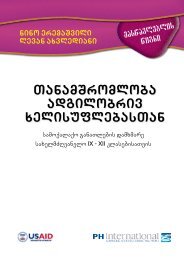The Geneva Protocol, by David Hunter Miller
The Geneva Protocol, by David Hunter Miller
The Geneva Protocol, by David Hunter Miller
Create successful ePaper yourself
Turn your PDF publications into a flip-book with our unique Google optimized e-Paper software.
CHAPTER XV. 61<br />
from treaty and consequently not a situation binding on Third States, but as to them simply a situation in<br />
which their rights were governed <strong>by</strong> the principles of international law. Under these rules, the nearest<br />
approach to such a situation is the so-called pacific blockade of the past.<br />
{92}<br />
In my view, which is the view of the vast majority of writers on the question, Third States do not have to<br />
respect a pacific blockade. (See Oppenheim, 3rd edition, Vol. II, page 56.) Accordingly, it seems to me that<br />
the United States would be entitled to regard such a blockade as not affecting her commerce with Russia.[6]<br />
If the United States took such a position, as probably she would, the practical value of such a blockade would<br />
be very largely diminished, for I do not think there is any doubt that the Members of the League would admit<br />
that the blockade only applied to such Third States outside the League of Nations as might acquiesce in it.<br />
Under the <strong>Protocol</strong>, precisely the same legal situation as to the blockade of Russia exists as under the<br />
Covenant and the same conclusions would follow. However, the probability of such a blockade under the<br />
<strong>Protocol</strong>, without an actual state of war resulting, is much less than under the Covenant. <strong>The</strong> <strong>Protocol</strong><br />
provides definitely for military sanctions and it can hardly be doubted, as a matter of reality, that if the<br />
sanctions of the <strong>Protocol</strong> commenced to be applied to a State in or out of the League and that State resisted,<br />
the result would be war as between that resisting State and at least those of the Members of the League, like<br />
Great Britain, that were taking a real part in the application of the sanctions.<br />
And, as pointed out above, the legal situation is much clearer in the case of war than in the case of this<br />
economic and financial boycott of the Covenant. It would be much "easier"[7] to go to war than it would be to<br />
apply the economic and financial sanctions alone. <strong>The</strong> world has gotten more or less used, in a legal sense, to<br />
the legalities and illegalities of war; but there are no precedents as to the corresponding situations[8] in such a<br />
{93} blockade as has been suggested; and it is, above all, custom and general agreement that make<br />
international law.<br />
I may sum up my views on this point as follows:<br />
If under either the Covenant or the <strong>Protocol</strong>, the economic sanctions were applied either against a Member of<br />
the League or a non-Member of the League and the application of these sanctions did not result in war, the<br />
United States legally could, and very likely would, contend that any resulting blockade was not applicable to<br />
the United States and the commerce and intercourse of her residents; and this view would be accepted <strong>by</strong> the<br />
Members of the League as being legally sound; and the result of course would be that the practical effect of<br />
any such blockade would be very much weakened.<br />
However, if the application of the sanctions either of the Covenant or of the <strong>Protocol</strong> resulted in war between<br />
the State against which the sanctions were applied and the States applying them, the United States could not<br />
object to that state of war, although of course it would have its rights as a neutral in such a war as in any other<br />
war and these neutral rights would not be affected <strong>by</strong> any provision of either the Covenant or the <strong>Protocol</strong>.<br />
<strong>The</strong> next consideration is the possible application of sanctions against the United States. From the foregoing<br />
review of the provisions of the Covenant and of the <strong>Protocol</strong> it is evident that such action against the United<br />
States is possible from a theoretic point of view. It is, however, important here to repeat that there is no<br />
possible sanction in either paper against a non-Member of the League except after war breaks out, a war<br />
which the non-Member of the League has commenced against a Member or against a Signatory to the<br />
<strong>Protocol</strong> as the case may be. In other words, the sanctions of either paper could only become operative against<br />
the United States after the United States had gone to war against a Member of the League.<br />
Continuing the theoretic view of the matter, it would be idle to discuss any difference between one kind of
















